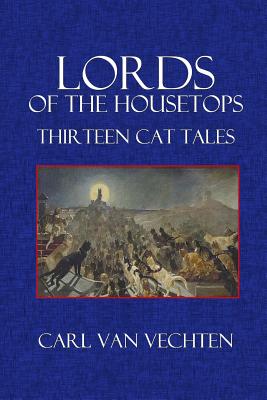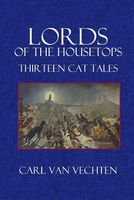- Welcome to FictionDB, Guest
- | My Account
- | Help

Lords of the Housetops — Carl Van Vechten
An excerpt from the PREFACE:
IN the essay and especially in poetry the cat has become a favourite subject, but in fiction it must be admitted that he lags considerably behind the dog. The reasons for this apparently arbitrary preference on the part of authors are perfectly easy to explain. The instinctive acts of the dog, who is a company-loving brute, are very human; his psychology on occasion is almost human. He often behaves as a man would behave. It is therefore a comparatively simple matter to insert a dog into a story about men, for he can often carry it along after the fashion of a human character.
But, as Andrew Lang has so well observed, literature can never take a thing simply for what it is worth. "The plain-dealing dog must be distinctly bored by the ever-growing obligation to live up to the anecdotes of him. . . . These anecdotes are not told for his sake; they are told to save the self-respect of people who want an idol, and who are distorting him into a figure of pure convention for their domestic altars. He is now expected to discriminate between relations and mere friends of the house; to wag his tail at God Save the Queen; to count up to five in chips of fire-wood, and to seven in mutton bones; to howl for all deaths in the family above the degree of second cousin; to post letters, and refuse them when they have been insufficiently stamped; and last, and most intolerable, to show a tender solicitude when tabby is out of sorts." The flog, indeed, for the most part, has become as sentimental and conventional a figure in current fiction as the ghost who haunts the ouija board or the idealistic soldier returned from the wars to reconstruct his own country.
Now the cat, independent, liberty-loving, graceful, strong, resourceful, dignified, and self-respecting, has a psychology essentially feline, which has few points of contact with human psychology. The cat does not rescue babies from drowning or say his prayers in real life; consequently any attempt to make him do so in fiction would be ridiculous. He has, to be sure, his own virtues. To me these are considerably greater than those of any other animal. But the fact remains that the satisfactory treatment of the cat in fiction requires not only a deep knowledge of but also a deep affection for the sphinx of the fireside. Even then the difficulties can only be met in part, for the novelist must devise a situation in which human and feline psychology can be merged. The Egyptians probably could have written good cat stories. Perhaps they did. I sometimes ponder over the possibility of a cat room having been destroyed in the celebrated holocaust of Alexandria. The folk and fairy tales devoted to the cat, of which there are many, are based on an understanding, although often superficial, of cat traits. But the moderns, speaking generally, have not been able to do justice, in the novel or the short story, to this occult and lovable little beast....
IN the essay and especially in poetry the cat has become a favourite subject, but in fiction it must be admitted that he lags considerably behind the dog. The reasons for this apparently arbitrary preference on the part of authors are perfectly easy to explain. The instinctive acts of the dog, who is a company-loving brute, are very human; his psychology on occasion is almost human. He often behaves as a man would behave. It is therefore a comparatively simple matter to insert a dog into a story about men, for he can often carry it along after the fashion of a human character.
But, as Andrew Lang has so well observed, literature can never take a thing simply for what it is worth. "The plain-dealing dog must be distinctly bored by the ever-growing obligation to live up to the anecdotes of him. . . . These anecdotes are not told for his sake; they are told to save the self-respect of people who want an idol, and who are distorting him into a figure of pure convention for their domestic altars. He is now expected to discriminate between relations and mere friends of the house; to wag his tail at God Save the Queen; to count up to five in chips of fire-wood, and to seven in mutton bones; to howl for all deaths in the family above the degree of second cousin; to post letters, and refuse them when they have been insufficiently stamped; and last, and most intolerable, to show a tender solicitude when tabby is out of sorts." The flog, indeed, for the most part, has become as sentimental and conventional a figure in current fiction as the ghost who haunts the ouija board or the idealistic soldier returned from the wars to reconstruct his own country.
Now the cat, independent, liberty-loving, graceful, strong, resourceful, dignified, and self-respecting, has a psychology essentially feline, which has few points of contact with human psychology. The cat does not rescue babies from drowning or say his prayers in real life; consequently any attempt to make him do so in fiction would be ridiculous. He has, to be sure, his own virtues. To me these are considerably greater than those of any other animal. But the fact remains that the satisfactory treatment of the cat in fiction requires not only a deep knowledge of but also a deep affection for the sphinx of the fireside. Even then the difficulties can only be met in part, for the novelist must devise a situation in which human and feline psychology can be merged. The Egyptians probably could have written good cat stories. Perhaps they did. I sometimes ponder over the possibility of a cat room having been destroyed in the celebrated holocaust of Alexandria. The folk and fairy tales devoted to the cat, of which there are many, are based on an understanding, although often superficial, of cat traits. But the moderns, speaking generally, have not been able to do justice, in the novel or the short story, to this occult and lovable little beast....
Genres
Click on any of the links above to see more books like this one.



